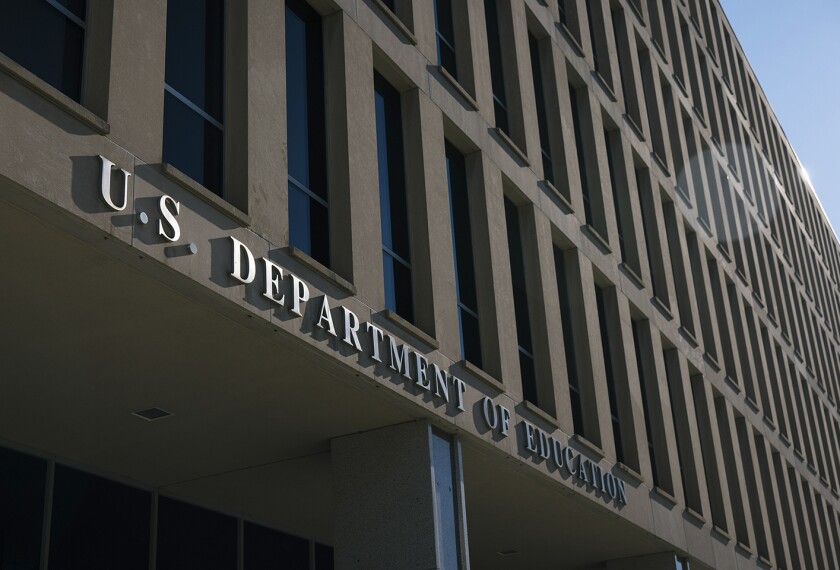Seven leading civil rights groups, including the NAACP and the National Urban League, called on U.S. Secretary of Education Arne Duncan today to dismantle core pieces of his education agenda, arguing that his emphases on expanding charter schools, closing low-performing schools, and using competitive rather than formula funding are detrimental to low-income and minority children.
The groups, which today released their own education policy framework and launched the National Opportunity to Learn campaign to advance their ideas, want Mr. Duncan to make big changes to his draft proposal for reauthorization of the Elementary and Secondary Education Act.
“While there are numerous positive aspects of the administration’s education agenda, more-comprehensive reforms are necessary to build a future where equitable educational opportunity is the rule, not the exception,” the framework says.
In addition to the National Association for the Advancement of Colored People, the supporting groups are: the NAACP Legal Defense and Educational Fund; the National Urban League; the Lawyers’ Committee for Civil Rights Under Law; the National Council on Educating Black Children; the Rainbow PUSH Coalition; and the Schott Foundation for Public Education.
For its part, the Education Department says it’s listening.
“The administration is dedicated to equity in education, and we’ve been working very closely with the civil rights community to develop the most effective policies to close the achievement gap, turn around low-performing schools, and put a good teacher in every classroom,” spokesman Justin Hamilton said in a statement. “The civil rights community has thoughtfully helped guide our thinking on these critical issues, and we need their continued leadership as we move forward to overhaul NCLB.”
Mr. Hamilton was referring to the No Child Left Behind Act, the current version of the ESEA.
Lower-Profile Launch
The civil rights groups had planned a national press event this morning in conjunction with the National Urban League’s annual conference in Washington to tout their new agenda, with prominent black leaders including the Revs. Jesse Jackson and Al Sharpton as headliners. But then the National Action Network, led by Mr. Sharpton, dropped out as a signatory and supporter of the new framework. The network did not respond to requests for comment.
And groups scaled back the framework’s public debut by canceling the press conference, citing scheduling conflicts.
The same day, leaders from each of the groups (minus Ben Jealous, the president of the NAACP) met with Mr. Duncan and Melody Barnes, the director of the White House Domestic Policy Council, to discuss their ideas. Both Mr. Duncan and President Barack Obama are scheduled to address the National Urban League this week during the group’s annual convention.
Regardless of how the public announcement unfolded, John H. Jackson, the president of the Massachusetts-based Schott Foundation, which works on equity issues, said today’s meeting with Obama administration officials was productive.
“There are elements within the agendas we agree on, but the fundamental challenge is the framing,” Mr. Jackson said. The department’s agenda is framed around competition for federal funding, through programs such as the Race to the Top, and charter schools, he said, “which are different values than those of the civil rights community, which has traditionally been about opportunity for all.”
The groups that signed on to the framework want Secretary Duncan to dial back his enthusiasm for and “extensive reliance” on charter schools as a solution for turning around persistently struggling schools in urban areas. They also object to core components of his four models for turning around the nation’s worst schools, saying that school closures and wholesale changes in school staff should only be used as a last resort. (“Schools Stuck at Bottom Target of $3 Billion Push,” Feb. 10, 2010.)
And they take sharp issue with the Race to the Top program, declaring that a reliance on competitive funding and handpicking winners means the majority of low-income and minority students, who may reside in the losing states, will not benefit from additional federal funds.
“I think [federal officials] really need to look at what we say about Race to the Top and competitive grants,” said Barbara R. Arnwine, the executive director of the Lawyers’ Committee for Civil Rights Under Law, one of the groups behind the new education framework. “We believe education is a civil right, and that means that everybody should have that right. There shouldn’t be winners and losers. That whole concept should be out of that discussion.”
The new Opportunity to Learn campaign is reminiscent of a similar push during the failed national standards movement of the 1990s. In both cases, the emphasis is not just on common standards that students, teachers, and schools should meet, but common inputs—such as money, good teachers, and a college-bound curriculum—that should be provided.
In addition to wanting Mr. Duncan to reverse course, the groups want the Department of Education to add or strengthen a few things in the ESEA blueprint, including universal access to early education for all children in all states. They want to strengthen the ability of students in low-performing schools to transfer to higher-performing ones, although Mr. Duncan has been backing away from current choice provisions already embedded in the No Child Left Behind Act. And they want, among other actions, for federal officials to hold states and districts more accountable in how they spend and distribute money from school to school.
One provision in the groups’ framework that Secretary Duncan already has agreed to do is to require parental engagement as part of the school turnaround process. In a July 14 speech to the NAACP, he announced that he would change the ESEA blueprint to require parental and community involvement as a condition of receiving federal school improvement grants.




